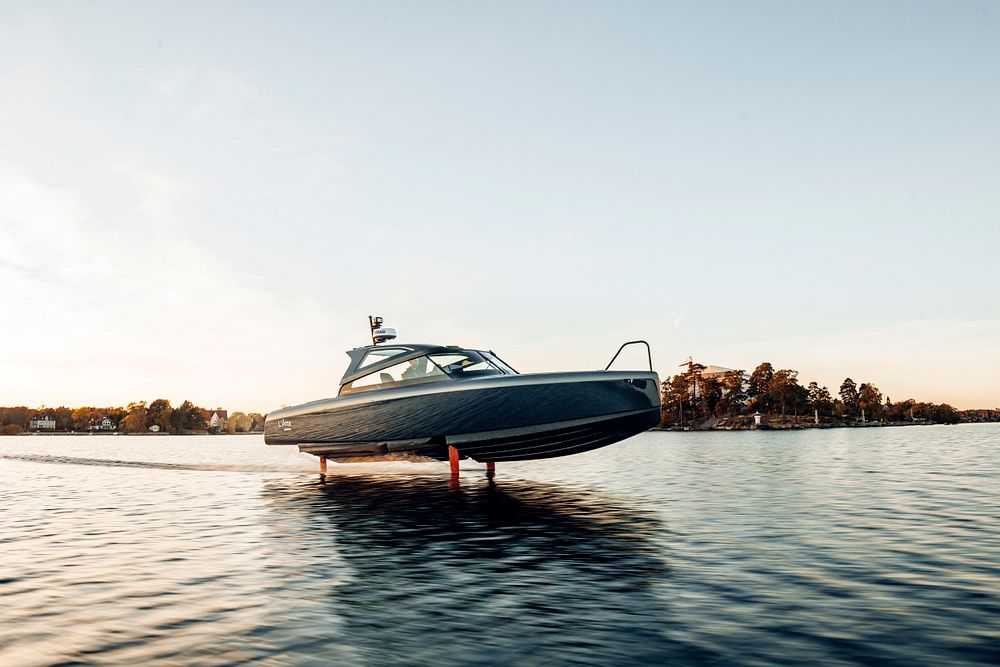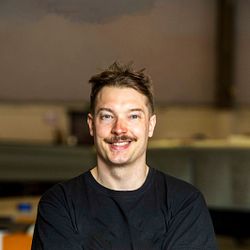
Press release -
This Flying Electric Ferry Can Transform Commuting in New England (and Cure Seasickness)
Cutting both travel times and costs, a new type of flying electric ferry could make commuting along the coast greener, faster, and far more pleasant. For passengers, perhaps the greatest perk of Candela’s hydrofoiling vessel is this: you won’t get seasick on board. Press demos will be held in conjunction with Newport International Boat Show.
At the Newport International Boat Show, Candela Technology — the Swedish company behind the world’s first electric hydrofoiling boats — will showcase its Candela C-8 leisure vessel, which “flies” above the water on underwater wings called hydrofoils.
These wings reduce energy use by a staggering 80% compared to conventional boats, unlocking both long range and high speed in an electric vessel — a world first. But there’s more. Once the sleek craft has lifted off, it is stabilized by Candela’s Flight Controller, a computer that uses an array of sensors scanning the water surface to keep the ride perfectly level, even in choppy seas.
The result: a digital pill for seasickness.

The Candela C-8 will be showcased during Newport International Boat Show
“Once you get the system working in all sorts of waves, it’s like a magic carpet experience — no bumps, pitching, or bobbing around,” says Gustav Hasselskog, CEO of Candela, who founded the company ten years ago to accelerate the transition to fossil-fuel-free waterways by building better electric boats.
After delivering over 100 leisure vessels, Hasselskog is determined to make electric flying ferries mainstream. Having already sold the Candela P-12 commuter ferry to Lake Tahoe, Candela believes the New England coast will be the next step.
The P-12, already in operation in Sweden and with customers ranging from New Zealand to Germany, is transforming coastal commuting.
A 30-passenger ferry cruising at up to 30 knots, it can make the trip from Providence to Newport in less than an hour. That means not only shorter travel times, but also up to 80% lower operating costs compared to conventional vessels — finally creating a powerful incentive to switch to electric ferries.
“Because the P-12 is so efficient, everything from chargers to batteries becomes smaller and cheaper, creating a very positive cost spiral,” says Hasselskog.
Fast electric ferries have yet to break through in the U.S., mainly because of performance issues with traditional hulls — short range at high speed — and excessive infrastructure costs. Conventional electric ferries need massive batteries and megawatt chargers, driving up both vessel and dockside expenses.
The P-12, in contrast, can fully charge its 300-kWh battery in under an hour using a standard, low-cost DC car charger.
Its compact size also opens the door for new transport models. Instead of relying on a single large vessel, many smaller P-12s can provide more frequent departures and more direct routes, improving service quality without raising per-passenger costs.
“Think of a Candela line like a bus line. Instead of giant ferries running infrequently, we envision smaller vessels departing often, with quick travel times and similar costs per passenger as a hybrid bus,” Hasselskog explains.
This concept has already been proven in Sweden's Stockholm, where Candela P-12 operates between a suburb and the city center. By flying above the water without creating wake, it received a speed exemption and cut travel times from over an hour to about 30 minutes.
Candela will showcase its groundbreaking technology in the form of Candela C-8, the best-selling electric recreational craft, at the Newport International Boat Show, September 11–14, including press demonstrations in conjunction with the show. The C-8 shows the advantage of hydrofoil technology, as it has set several international record for electric endurance, even making the first international electric boat voyage from Europe to Africa, as well as travelling from Sweden to Finland - and back - in one day.
PRESS CONTACT for sea trials: Mikael Mahlberg, mikael.mahlberg@candela.com +46765376678
Topics
Stockholm-based Candela Technology AB is the world leader in hydrofoiling electric vessels. The company was founded in 2014 by engineer and business leader Gustav Hasselskog with the mission to accelerate the world's transition to fossil fuel-free lakes and oceans by developing electric vessels that outperform those powered by fossil fuels.
Candela's watercraft have wings (hydrofoils) that lift the hull above the water and reduce friction, using 80% less energy than conventional ships at high speed. This technology allows for long-range water travel solely on battery power, a first in the industry. Candela's hydrofoils also enable operators to transition to sustainable fleets by providing up to 50% lower operational costs.
At the heart of Candela's hydrofoil tech stack is the Flight controller, which automatically stabilizes the vessel during flight by regulating the foils, using sensors that gauge wave height and wind speed, among other factors. Even in rough weather, passengers experience 90% less g-forces than they would on a traditional boat. All Candela vessels are fully connected and receive over-the-air updates.
After five years of research and development, Candela began producing the world's first electric hydrofoil leisure boat in 2019, the Candela C-7 open "roadster of the seas". This was followed in 2022 by the high-volume market Candela C-8, which was delivered to the first customers in spring 2023. Over 150 C-8 units have been sold to date, and the vessel has been lauded as a "game changer" by Motorboat and Yachting magazine, winning numerous awards including the 2022 European Powerboat of the Year award for its superior seakeeping, long range, and high speed.
In 2023, Candela launched its first commercial vessel, the Candela P-12 Shuttle ferry. It is the fastest and longest-range electric ship ever built, with a top speed of 30 knots and a range of 40 nautical miles at 25 knots. It is also the most energy-efficient fast ship ever made in its size class. Substantial operational cost savings are expected. The first unit enters service in Stockholm's public transport system in 2024.
Candela is a technology company with headquarters in Stockholm, Sweden, employing over 200 engineers, technicians, and production staff. The company develops the entire tech stack, from the C-POD motor to the control system and carbon fiber hulls, in-house. Candela's two wholly-owned factories in Stockholm, Sweden, produce the Candela C-8 and P-12 vessels. The company also has leisure boat resellers in 12 countries and wholly-owned sales offices in San Francisco, USA, and Cannes, France.


